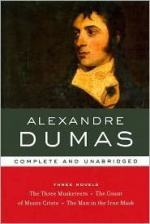Ah! no, we were mistaken; he had discovered a purchaser for his diamond.
The breakfast at M. de Treville’s was as gay and cheerful as possible. D’Artagnan already wore his uniform—for being nearly of the same size as Aramis, and as Aramis was so liberally paid by the publisher who purchased his poem as to allow him to buy everything double, he sold his friend a complete outfit.
D’Artagnan would have been at the height of his wishes if he had not constantly seen Milady like a dark cloud hovering in the horizon.
After breakfast, it was agreed that they should meet again in the evening at Athos’s lodging, and there finish their plans.
D’Artagnan passed the day in exhibiting his Musketeer’s uniform in every street of the camp.
In the evening, at the appointed hour, the four friends met. There only remained three things to decide—what they should write to Milady’s brother; what they should write to the clever person at Tours; and which should be the lackeys to carry the letters.
Everyone offered his own. Athos talked of the discretion of Grimaud, who never spoke a word but when his master unlocked his mouth. Porthos boasted of the strength of Mousqueton, who was big enough to thrash four men of ordinary size. Aramis, confiding in the address of Bazin, made a pompous eulogium on his candidate. Finally, d’Artagnan had entire faith in the bravery of Planchet, and reminded them of the manner in which he had conducted himself in the ticklish affair of Boulogne.
These four virtues disputed the prize for a length of time, and gave birth to magnificent speeches which we do not repeat here for fear they should be deemed too long.
“Unfortunately,” said Athos, “he whom we send must possess in himself alone the four qualities united.”
“But where is such a lackey to be found?”
“Not to be found!” cried Athos. “I know it well, so take Grimaud.”
“Take Mousqueton.”
“Take Bazin.”
“Take Planchet. Planchet is brave and shrewd; they are two qualities out of the four.”
“Gentlemen,” said Aramis, “the principal question is not to know which of our four lackeys is the most discreet, the most strong, the most clever, or the most brave; the principal thing is to know which loves money the best.”
“What Aramis says is very sensible,” replied Athos; “we must speculate upon the faults of people, and not upon their virtues. Monsieur Abbe, you are a great moralist.”
“Doubtless,” said Aramis, “for we not only require to be well served in order to succeed, but moreover, not to fail; for in case of failure, heads are in question, not for our lackeys—”
“Speak lower, Aramis,” said Athos.
“That’s wise—not for the lackeys,” resumed Aramis, “but for the master—for the masters, we may say. Are our lackeys sufficiently devoted to us to risk their lives for us? No.”




